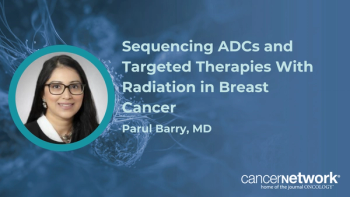
Oncology NEWS International
- Oncology NEWS International Vol 9 No 1
- Volume 9
- Issue 1
Goserelin Reduces Breast Ca Recurrence in Younger Women
SAN ANTONIO-Estrogen suppression using goserelin (Zoladex) increased the relapse-free interval in premenopausal women with early stage breast cancer, compared with no goserelin, according to an interim analysis of the ZIPP (Zoladex in Premenopausal Patients) trial. Michael Baum, MD, of the Cancer Research Campaign, London, presented the results at the San Antonio Breast Cancer Symposium.
SAN ANTONIOEstrogen suppression using goserelin (Zoladex) increased the relapse-free interval in premenopausal women with early stage breast cancer, compared with no goserelin, according to an interim analysis of the ZIPP (Zoladex in Premenopausal Patients) trial. Michael Baum, MD, of the Cancer Research Campaign, London, presented the results at the San Antonio Breast Cancer Symposium.
The origins of this trial go back to the world overview of 1995, Dr. Baum said. The surprise finding of the overview was the effectiveness of ovarian ablation. The ZIPP trial, with 2,648 participants, is larger than the overview of ovarian ablation, with 2,000, he noted.
Patients were randomized after surgery to one of four groups: no adjuvant hormonal therapy, goserelin for 2 years, tamoxifen (Nolvadex) for 2 years, and both goserelin and tamoxifen for 2 years. As part of the primary treatment, physicians could elect to use chemotherapy in high-risk women, Dr. Baum said, and, in fact, most node-positive women received chemotherapy.
Furthermore, midway through the recruitment phase of the trial, physicians were given the option to offer patients tamoxifen and only randomize patients to goserelin or no goserelin.
With a median duration of follow-up of just over 5 years, there have been 411 first events (local recurrence, distant recurrence, or new primary tumor) in patients not receiving goserelin and 330 among those receiving goserelin, resulting in a relative risk for event-free survival of .77, highly significant favoring goserelin, Dr. Baum said.
The major reduction in events has been in local recurrence, but Dr. Baum noted a trend toward a reduction in new primary tumors in the contralateral breast: 42 cases have been seen in those not receiving goserelin vs 28 in those receiving goserelin. Dr. Baum called this fairly compelling evidence that we should be concentrating trials of goserelin in the primary prevention of breast cancer in high-risk young women.
Subgroup analyses showed that in patients who did not receive adjuvant chemotherapy, the effects of goserelin on disease-free survival were greater, with a relative risk of .69, compared with the overall effect of .77. In the presence of chemotherapy, we appear to lose that effect, he said.
As might be expected, the effect of goserelin is predominantly seen in ER-positive patients, with a relative risk of .71. No benefit is emerging for the ER-negative cases, Dr. Baum said.
There is also a significant trend toward greater benefit of goserelin among younger women. This becomes most dramatic when we split the data above and below the age of 40, he said.
Conclusions
Dr. Baum concluded, At a median follow-up of 5 years, premenopausal patients receiving goserelin have a significantly prolonged event-free survival. There is an improved overall survival, but this is not as yet significant. Furthermore, pending formal multivariate analyses, I think it is reasonable to suggest that, for disease-free survival, goserelin was most beneficial in the young, ER-positive patients who were not concurrently receiving chemotherapy.
Responding to a question from the audience, Dr. Baum agreed that goserelin may not produce better results than adjuvant chemotherapy in younger women, but stressed that goserelin is a reversible form of ovarian suppression and does potentially offer a choice for the very young premenopausal woman who wishes to retain her fertility.
Articles in this issue
about 26 years ago
New Strategies for Treating Ovarian Cancerabout 26 years ago
Researchers See More Effective Lung Cancer Screening, Therapyabout 26 years ago
ODAC Recommends Approval of Targretin for Advanced CTCLabout 26 years ago
IOM Assessing Early Breast Cancer Detection Technologiesabout 26 years ago
CRFA Honors Three With Its 1999 FrontLine Awardsabout 26 years ago
Aromasin, New Hormonal Agent, Approved for Breast Cancerabout 26 years ago
LEDs Developed by NASA Used to Ablate Brain Tumorsabout 26 years ago
Early Androgen Deprivation Beneficialabout 26 years ago
Higher-Dose RT May Improve Prostate Cancer Outcomeabout 26 years ago
Learning How to Break Bad News to PatientsNewsletter
Stay up to date on recent advances in the multidisciplinary approach to cancer.





































